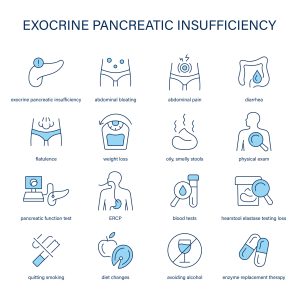 Exocrine pancreatic insufficiency (EPI) occurs when the pancreas doesn’t make enough digestive enzymes. Enzymes are proteins that cause chemical reactions in the body. Digestive enzymes break down food, allowing the body to get nutrients.
Exocrine pancreatic insufficiency (EPI) occurs when the pancreas doesn’t make enough digestive enzymes. Enzymes are proteins that cause chemical reactions in the body. Digestive enzymes break down food, allowing the body to get nutrients.
When you have EPI, food passes through the intestines in an undigested state, resulting in the body not receiving the needed nutrients. There are different types of pancreatic enzymes, including:
- Amylase
- Lipase
- Protease and elastase
The main cause of EPI in adults is chronic pancreatitis. As many as 8 in 10 adults with this disorder develop EPI. Pancreatitis causes inflammation and swelling of the pancreas. Over time, chronic inflammation can damage the digestive enzyme-making pancreatic cells. Other causes of EPI in adults include:
- Celiac disease
- Diabetes
- Inflammatory bowel disease (IBD)
- Pancreatic cancer
- Surgery on the digestive tract, including weight loss surgery
Cystic fibrosis is the top cause of EPI in infants and children. Children inherit cystic fibrosis from a parent. Cystic fibrosis causes thick mucus to build up in the lungs, making breathing hard. Mucus can also collect in the pancreas, keeping digestive enzymes from reaching the small intestines.
Nearly 9 in 10 infants with cystic fibrosis develop EPI within the first year. The rest are at risk of developing EPI during childhood or adulthood.
Shwachman-Diamond syndrome (SDS) is another inherited condition that causes EPI in children. SDS causes the part of the pancreas that makes enzymes not to work properly.
People with EPI have a particularly difficult time absorbing fats from foods, which leads to uncomfortable digestive problems, such as:
- Abdominal pain, gas, and bloating
- Constipation
- Diarrhea
- Fatty stools
- Unexplained weight loss or failure to thrive in infants and children
Many digestive problems can cause symptoms similar to EPI. A healthcare provider may suspect EPI if you have a condition that affects your pancreas.
You may get one or more pancreas function tests that include:
- Fecal elastase test (FE-1)
- Fecal fat test
- Secretin pancreatic function test
You may also get a CT scan, abdominal ultrasound, or other imaging tests that can spot problems with the pancreas that lead to EPI.
People with EPI can’t absorb enough fats, proteins, and carbohydrates from the foods they eat. This problem is called malabsorption. Your body needs these nutrients for energy and to maintain organ function. Malabsorption of nutrients can lead to malnutrition. Signs of malnutrition include:
- Dry skin
- Depression
- Edema
- Fatigue or dizziness
- Feeling cold all the time
- Irritability
- Memory and concentration issues
- Muscle loss
EPI is a lifelong condition. Treatments for the condition focus on the body receiving the necessary nutrients to maintain good health. Treatments include:
- Pancreatic enzyme replacement therapy (PERT)
- High-calorie, high-fat diet
- Vitamins
To prevent EPI, it is helpful to avoid smoking and alcohol use as they make the pancreas work harder and can contribute to pancreatitis, which leads to EPI.
Unfortunately, cystic fibrosis and SDS are inherited, so they can’t be prevented, and the risk of EPI with these conditions can’t be lowered. Keeping a close eye on symptoms can help identify possible EPI and treat it immediately.
If you are experiencing symptoms of exocrine pancreatic insufficiency, you can schedule an appointment with a gastroenterologist at Flushing Hospital’s Ambulatory Care Center by ca
All content of this newsletter is intended for general information purposes only and is not intended or implied to be a substitute for professional medical advice, diagnosis or treatment. Please consult a medical professional before adopting any of the suggestions on this page. You must never disregard professional medical advice or delay seeking medical treatment based upon any content of this newsletter. PROMPTLY CONSULT YOUR PHYSICIAN OR CALL 911 IF YOU BELIEVE YOU HAVE A MEDICAL EMERGENCY.
